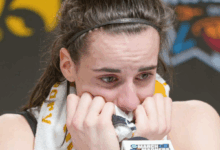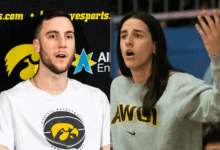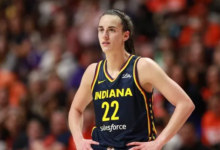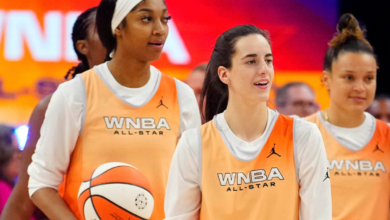Jason Whitlock EXPOSES DEWANNA BONNER After RACIST Attacks on Caitlin Clark!
Jason Whitlock Criticizes DeWanna Bonner After Racial Attacks on Caitlin Clark!

The WNBA playoff series between the Connecticut Sun and the Indiana Fever has sparked controversy, with tensions on and off the court centering around Caitlin Clark, DeWanna Bonner, and DiJonai Carrington. At the heart of the drama was an incident involving Carrington poking Clark in the eye, which many fans perceived as intentional, igniting a heated debate on race, sportsmanship, and social media’s role in modern sports.
Commentator Jason Whitlock, known for his outspoken views, quickly entered the conversation. Whitlock accused Alyssa Thomas, a Connecticut Sun player, of deflecting attention from Carrington’s actions by framing the backlash against her as racially motivated. During a post-game interview, Thomas claimed that Clark’s predominantly white fanbase was attacking Carrington out of racism, a sentiment she hadn’t encountered in her 11-year career. According to Whitlock, however, the real issue was Carrington’s behavior on the court, not racial dynamics.
The controversy began with the eye-poking incident. Carrington’s hand made contact with Clark’s eye, causing her to fall in pain. With no foul called, social media erupted with fans calling for Carrington to be held accountable. Many saw it as unsportsmanlike conduct and demanded her suspension. This online uproar intensified after Thomas suggested that the criticism was racially charged, rather than focused on Carrington’s play.
Whitlock’s response to Thomas was direct. He argued that her claims of racism were an attempt to shield Carrington from the real issue – her actions on the court. According to him, the controversy wasn’t about race, but rather about Carrington’s unsportsmanlike behavior. Whitlock’s critique struck a chord, sparking yet another layer of debate. Was Thomas justified in accusing Clark’s fans of racism, or was she using identity politics to shift the focus from Carrington’s conduct?
For Whitlock, the answer was clear: the focus should be on the actions during the game, not on accusations of racism. He pointed out that Clark has risen to unprecedented levels of stardom, becoming a household name and a major box-office draw in the WNBA. This meteoric rise, however, has brought its own level of scrutiny, both for Clark and for those around her, including Carrington and Thomas.
Whitlock suggested that the animosity towards Clark could stem from jealousy over her success. Clark has broken records, secured major endorsement deals, and is considered one of the most exciting players in women’s basketball. Such dominance could naturally create tension among her peers. Nonetheless, Whitlock didn’t entirely dismiss Thomas’s accusations of racism, acknowledging that athletes of color, particularly women, face unique challenges in sports. The rise of social media has made it easier for fans to connect with their favorite players, but it has also opened the door to abuse and harassment.
As Thomas highlighted, she and her teammates have faced a barrage of hateful, racially charged comments. The eye-poking incident further exposed the toxic culture surrounding women’s sports, with social media increasingly becoming a battleground for hate speech and vitriol. While Thomas’s frustration is understandable, Whitlock emphasized that the issue of accountability cannot be ignored. Carrington’s play, in his view, was unsportsmanlike and should have been addressed by the WNBA.
The WNBA’s handling of the situation has also come under scrutiny. Whitlock called for the league to take a stronger stance in reviewing the incident, particularly given the growing pressure on players like Clark. The incident has become a flashpoint for a broader conversation about race, power, and privilege in the WNBA. While Whitlock believes the accusations of racism are a diversion from the real issue, it is clear that both sides of the argument hold weight.
On the one hand, Carrington’s actions deserve scrutiny, and the WNBA must ensure fair play and player safety. On the other hand, the broader issues of racism and sexism in sports cannot be ignored. Thomas’s decision to speak out reflects the ongoing challenges that athletes of color face in an industry still grappling with inequality. The debate surrounding this incident is far from over, and it highlights the complexities that continue to shape the world of women’s sports.




